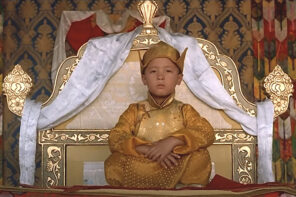A young Tibetan lama, recognized by the Dalai Lama as the 17th Karmapa, a top spot in the Tibetan religious hierarchy of reincarnated leaders, has been caught up for the past month in a surprising scandal. But the real interest of it is not the crime the Karmapa and his community were accused of (warehousing Chinese money in monks’ dwellings) but why the Indian government, host to Tibet’s exiled spiritual leadership, chose to target him. For many observers, the widely-hyped investigation was an indication of the intensifying strain between India and China regarding Tibet, and an ominous suggestion of trouble to come for the Tibetan culture-in-exile once the Dalai Lama, now 75, is gone. – The Eds.
The birth of a scandal
I was there in Bodhgaya in the winter of 2006, attending a busy and crowded prayer ceremony organized by the Kagyu School of Tibetan Buddhism. Devotees and pilgrims from all over the world, including China, had come there. I saw visitors from the Mainland China offering donations in Chinese currency, during a prayer session led by the 17th Karmapa Ogyen Trinley Dorje.
The donations came in small notes from the country of their origin. Helpers and translators were accepting and writing down each transaction in great detail, the names of the people, for whom they were praying for, for what reason. This seemingly innocuous religious exercise last month snowballed into front-page news after police seized more than a million dollars in cash at the Karmapa’s makeshift headquarters near Dharamsala in North India.
The Central Government of India, following weeks of investigation, finally cleared Karmapa of any wrongdoing (the money they found had indeed been an accumulation of donations).
Speculations abound on what really triggered the raid last month, and there are various conspiracy theories, though it now appears that local politics played a key role. After the money was seized, all the key figures in the state, including the head of the police, were seen on television, joined forces and declared him guilty long before the investigation was over.
Many of them said he was a “Chinese plant” in India and a “Chinese agent” because he is the only Tibetan reincarnation to be recognized by both the China and the Dalai Lama, and he speaks Chinese, and he has a huge following amongst the Han Chinese diaspora.
Journalists or stenographers?
For Tibetans in India, this incident reveals the dilemma faced by Tibetans, subjects without citizenship, and it also shows how Tibetan refugees in India can get caught in the crossfire of a curious politics between the central government (led by the Nationalist Congress Party) and the state (under the Bharatiya Janata Party, the BJP). Earlier, even after his own state’s highest ranking civil servant gave Karmapa “a clean chit,” BJP’s Prem Kumar Dhumal, chief minister of Himachal Pradesh, refused to do so, insisting to the media that investigations would continue.
Further complicating the reality is India’s sensationalist media. During a month-long media blitz TV talk shows offered up well-known Tibetan poets and politicians to be grilled by combative anchors for not following the “law of the land.” And at least on this issue, the Indian news media failed disastrously by acting as stenographers, indiscriminately taking in whatever was fed to them by intelligence officials, police, and local politicians. Journalists seemed to become the medium through which any analyst and former official with a view on Tibet and China could fire a cheap shot. The Indian government’s assertiveness vis-à-vis China is refreshing (though achieving it at the expense of refugees and Buddhist monks who fled China at 14 to get an education smacks of bad taste.)
The affair has also unsettled the sentiments of those living in India’s predominantly Buddhist Himalayan region, which separates China from India. There were large protests in the capitals of both Ladakh and Sikkim, as well as in the capital Delhi, even though media failed to give much coverage. Western followers of Tibetan Buddhism, a significant source of tourist revenue to Himachal Pradesh and elsewhere, remain extremely disappointed, more at the media than the authorities.
An initiation into politics
The sheer preposterousness of the claims, about the Karmapa’s status as a “spy” in particular, did lead international Tibet specialists, such as Dibyesh Anand and Tsering Shakya, to weigh in. (Facebook pages were quickly created; supporters put up Karmapa’s images as profile pictures.)
The saga seems to have come to an end for now, though it would be premature to say it’s a happy one. The status of Karmapa in India remains fragile and fraught with complications. (There are at least other two claimants to the seat of the 17th Karmapa, one of which, Thaye Dorjee, backed by Shamarpa Lama, is highly influential and widely travels the world as his rival remains homebound by travel bans.) [Peter Lee of Asia Times has written a comprehensive article explaining the tangle of interests surrounding the rivalries that have led to the anointing of more than one Karmapa. -Eds.]
If there is one positive outcome, it is that the controversy has raised the profile of Karmapa, albeit to an unwelcome level. It has also formally instantiated him into the politics of India, China and Tibet, something, which the Karmapas in the past have avoided. His predecessor the 16th Karmapa, who passed away in 1981, preferred to remain that way. However, given the prospective role—which actually now looks more and more like an obligation—that this Karmapa could play going forward, this latest incident may have served a significant purpose.




